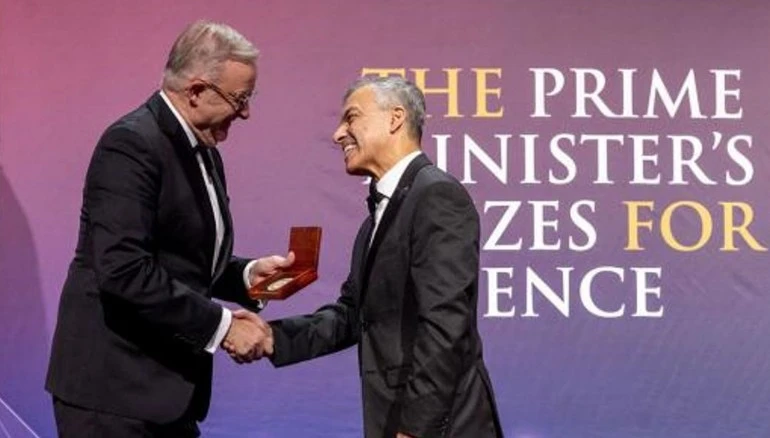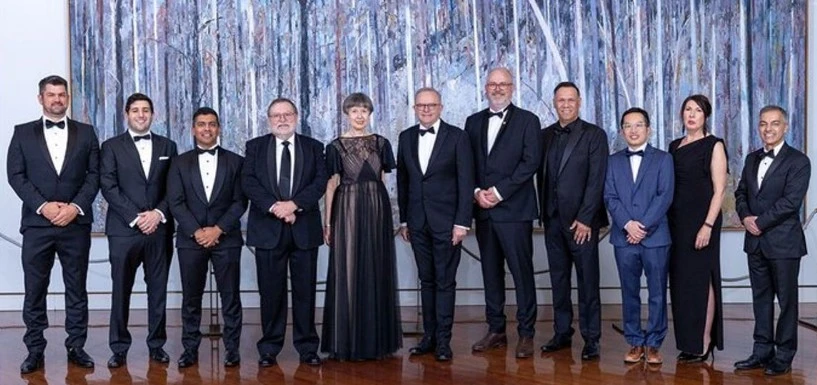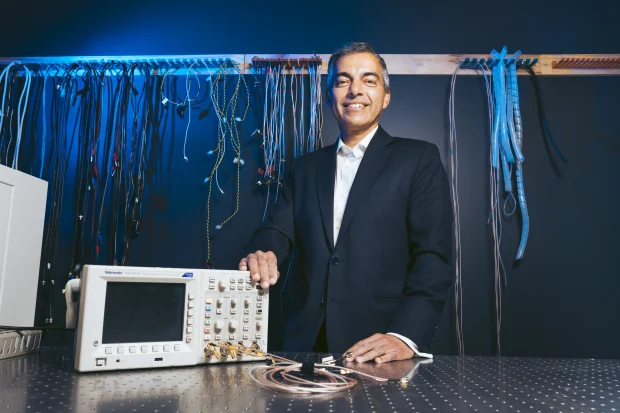(November 21, 2025) Australia-based Indian-origin scientist and entrepreneur Vikram Sharma is one of the leading figures in quantum cybersecurity, a field focused on protecting digital information from the powerful computers of today and the even more advanced systems being developed for the future. He recently won Australia’s 2025 Prime Minister’s Prize for Innovation for his pioneering work in transforming cutting-edge quantum research into practical cybersecurity solutions. “This is a wonderful tribute to the extraordinary work of our team and recognition well beyond anything one could have ever dreamt about,” Sharma said upon receiving the honour.
The $250,000 prize recognises his achievement in turning some of the most complex quantum science, which explores how matter behaves at the smallest scales, into powerful cybersecurity tools now used by industries around the world. As the founder and CEO of QuintessenceLabs, he has helped shape understanding of how nations must prepare for a quantum-powered world.
His expertise is sought internationally through roles as an advisory board member with World Economic Forum and the Sydney Quantum Academy as well as the UK government’s advisory panel on quantum technology with which he was associated in the past. The scientist-entrepreneur’s solutions, already used across four continents, show how deep physics can be translated into real-world protection at a time when digital trust is increasingly fragile.

Australia-based Vikram Sharma receives 2025 Prime Minister’s Award for Innovation
From a diplomat’s son to a global thinker
Born in Chandigarh, Vikram Sharma spent his early years moving from one international city to another due to his father’s diplomatic career. This global childhood sharpened his instincts for adaptation and curiosity, making him comfortable with complexity long before he began navigating the demanding worlds of physics, entrepreneurship and security. By the time he arrived in Australia as a teenager, he possessed a worldview shaped by constant observation and the ability to see systems from the inside out.
Early encounters with technology
His first paid job came at the age of 17, when he helped government teams decommission large mainframe computers. The work was physical and required dismantling machines, removing thick coils of wiring, and loading heavy systems onto trucks but the lesson it offered was that technology, however advanced in its moment, could quickly be overtaken by newer ideas. The rapid obsolescence of these once-mighty machines left him with a lasting awareness that staying ahead of technological change was essential for both innovation and security.
Entrepreneurial beginnings in India and Australia
After completing his early university studies, he moved into hands-on technical roles, beginning his career as a programmer analyst and later working as a consultant for prominent professional services firms in Australia. These years gave him a ground-level view of how organisations managed large systems, built infrastructure and secured sensitive information, gaining insights that would later prove invaluable.
Armed with this experience, he began channeling his understanding of technology into entrepreneurial ventures. In India, he helped establish one of the country’s first private Internet service providers, contributing to the nation’s early digital backbone at a time when Internet access was just beginning to take off. After returning to Australia, he founded an IT consulting company that delivered over 70 federal government projects. The work was technically sophisticated and financially successful, but it gradually revealed to him what it lacked: a deeper sense of purpose. As he later reflected on a Stanford Business interview, each new assignment began to feel like “a slightly different version of the same flavor,” prompting him to rethink what he truly wanted his work to achieve.

Vikram Sharma (far right) with PM Anthony Albanese and other receipients of the 2025 Prime Minister’s Prize
A turning point at Stanford
That search for meaning led him to return to the academia and join the Stanford University’s prestigious Sloan Fellows program, where he earned a Master of Science in Management. Immersed in Silicon Valley’s culture of reinvention, Sharma found his thinking shifting, but the true turning point came not in a business strategy course but in a physics classroom. Nobel laureate Steven Chu welcomed him to sit in on lectures, and it was here that Sharma first encountered the concept of quantum key distribution, a revolutionary idea that quantum mechanics could be used to build encryption systems that cannot be broken.
The idea struck him as both elegant and urgent. It united his technical background in IT with his long-standing fascination with physics and opened a path toward a field that could reshape global security.
Returning to Australia: A Quantum awakening
When Vikram Sharma returned to Canberra, motivated by this discovery, he joined the Australian National University, embarking on a PhD in quantum physics. Working with the Quantum Optics Group in the Department of Physics, he contributed to one of the world’s earliest demonstrations of second-generation quantum key distribution. The achievement marked a critical step in proving that quantum-secure communication could move from theoretical possibility to functional technology. This research would become the foundation of his life’s most influential work, and took shape of QuintessenceLabs.
Founding QuintessenceLabs
QuintessenceLabs emerged as a direct outcome of Sharma’s time at ANU. His vision was to convert the deep scientific promise of quantum mechanics into practical cybersecurity tools capable of protecting the world against threats not yet fully visible. Under his leadership, the company began building systems that generated true randomness for encryption, managed cryptographic keys at massive scale, and enabled secure communication channels using the principles of quantum mechanics. These technologies, once considered futuristic, are now deployed across four continents, positioning the Canberra-based company as a major global player in quantum cybersecurity.

Global recognition and leadership
QuintessenceLabs’ innovations have been recognised internationally. The company was named global runner-up in IBM’s SmartCamp competition from more than 2,500 entrants, selected as one of Westpac’s Businesses of Tomorrow, featured on the SINET16 Cyber Security Innovators list, and included in the CyberTech 100. The World Economic Forum also recognised it as a Global Innovator. Sharma’s personal leadership earned him the Pearcey State Award for Entrepreneurship and a fellowship with the Australian Computer Society, affirming his dual identity as both scientist and entrepreneur.
Australia’s strategic investment in Quantum
Earlier this year, the Australian government endorsed the importance of his work when the National Reconstruction Fund invested $15 million into QuintessenceLabs as the lead contributor in its $20 million funding round. The investment supports the creation of a new manufacturing facility in Canberra and will generate specialised quantum technology jobs. Upon receiving the Prime Minister’s Prize, Sharma emphasised how Australia was uniquely positioned to lead globally in quantum science, highlighting the essential partnerships between universities, government agencies and emerging industries.
Ideas formed in stillness
Despite working in one of the most intellectually demanding scientific fields, Sharma finds clarity away from technology. In an interview, years back, he mentioned that “a lot of the thinking around what is QuintessenceLabs today came from a trek to Everest Base Camp.” With no phones, vehicles or digital noise, the quiet of the mountains allowed ideas that shaped his most influential works. “You are left to take in some of the amazing beauty of nature in its rawest form, and your mind is freed to think openly,” he had remarked.
The philosophy behind his work
At the core of Vikram Sharma’s mission is a belief that the future depends on trust whether it is trust in communication, trust in digital systems, or trust in the vast networks that define modern life. With billions of devices connected through the Internet of Things and quantum computers poised to disrupt existing encryption, he sees safeguarding that trust as one of the defining challenges of our time. “If we can create enduring trust amongst myriad devices,” he told Stanford Business, “that would be a great impact to have on the world.”
On the path of securing digital future
From a diplomat’s son traveling across continents to a teenager dismantling old mainframes, from building early Internet infrastructure in India to pioneering breakthroughs in quantum physics in Australia, Vikram Sharma’s journey encompasses curiosity, reinvention and a commitment to meaningful innovation. His 2025 Prime Minister’s Prize for Innovation is a recognition of scientific achievement and also an affirmation of his vision for a secure digital future in which quantum science strengthens the world’s most vital systems.
- Follow Vikram Sharma on LinkedIn



